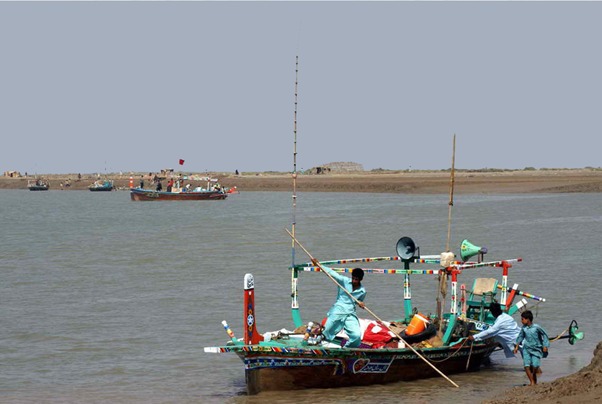INP-WealthPk
Shaukat Korai
The fishing community of Keti Bunder and Shah Bunder areas has welcomed the decision to establish two mini fish harbours in Thatta and Sujawal districts, viewing it as a resilient project for fishermen adversely affected by climate change. The initiative aims to support local livelihoods and promote sustainable fishing practices, providing much-needed relief and economic stability to the region's fishing communities. Mehran Shah, Chairman of Pakistan Fisher Folk Forum (PFF), stated that Keti Bunder and Shah Bunder are among the areas worst affected by sea intrusion and water shortages in the Indus River.
He noted that the community has lost sources of livelihood because of sea intrusion, as they depend on freshwater fish and cannot afford the costs of sea fishing, which require expensive equipment. “Authorities have promised to provide proper training in fishing techniques and offer financial support to help fishermen develop their own boats and acquire other necessary equipment,” Shah said. The PFF chairman believes this development will not only rehabilitate the vulnerable fishing community but also generate revenue, create job opportunities for locals and also enhance the quality of fish for export.
Officials from the Livestock and Fisheries Department said that the purpose of these harbours is threefold: to alleviate congestion at the already busy Karachi Fish Harbour, to promote small-scale fisheries, and to enhance local livelihoods. The combined cost of both harbours is estimated at Rs1.35 billion, with a three-year implementation timeline supported by provincial funding and foreign assistance. Asim Kareem, Director of the Fisheries and Livestock Department, told Wealth Pakistan that during a recent high-level meeting, the department briefed the chief minister and other officials about the project.
He explained that the main seafood landing site in the province has reached its capacity, leading to congestion, delays for fishing boats, and significant post-harvest losses. “Nearly half of the fish and shellfish catch deteriorates due to delayed unloading and low draft conditions, resulting in a loss of export value.” “To address these issues, the Livestock and Fisheries Department has proposed establishing fully-equipped mini harbours with modern auction halls, storage, and docking facilities at both the sites.
The Directorate of Fisheries (Marine and Inland) will implement the project, aiming to support small-scale fishermen, improve handling efficiency, and create new jobs,” he explained. The proposed mini harbour at Shah Bunder will feature berthing areas for small fishing vessels, refrigerated storage, fuelling and repair facilities, and an environmentally friendly waste management system. A modern auction hall will promote transparent fish trading and fair pricing, he pointed out.
Kareem said that this initiative is expected to boost the local fishing economy, encourage sustainable practices, and support eco-friendly coastal development. “Training workshops on post-harvest management, cooperative formation, and sustainability will also be part of the project.” “The development of mini harbours at Keti Bunder and Shah Bunder will be a milestone for Sindh’s coastal economy, strengthening local fisheries and helping coastal communities achieve financial stability," said Kareem. “Additionally, these locations are historically significant, having served as natural ports in earlier past.
The project is also expected to promote tourism and create new opportunities. The provincial government plans to develop the mini-fish harbours in the first phase, with a complete port to follow in the second phase,” he said. Both districts are conveniently located near major highways, including the motorway and national highway. This initiative aligns with Sindh’s vision for climate-resilient, inclusive, and sustainable coastal development, promising long-term benefits for fisheries, trade, and tourism in the Indus Delta region.

Credit: INP-WealthPk









